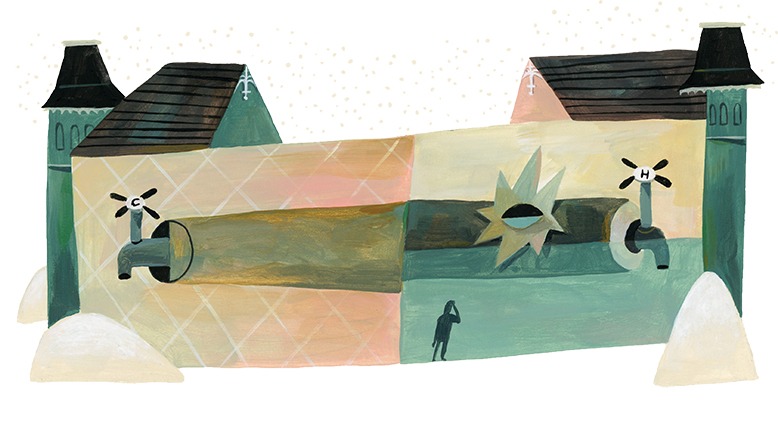
Illustration by Mark Hoffmann
It’s winter here in Jersey. It’s cold. Sometimes the pipes freeze; sometimes they even burst.
But why is it almost always the hot-water pipes? Wouldn’t cold-water pipes have a head start on freezing?
Three winters in a row, the plumber has come to my vintage 1886 Morristown house. Same problem: a frozen hot-water pipe. The first two times, he assured me it was fixed—nothing to worry about. The third time, one burst in the kitchen ceiling. Hot water poured down. As the ceiling disintegrated, the lights and fan fell to the floor. I ran down to the basement and shut the main valve. Three days later, the plumber arrived. If you feel like punishing yourself and your family for some indiscretion, try having no flushed toilets for three days.
Surrounded by debris, the plumber replaced a ripped-open section of copper pipe above where the ceiling had been. Alongside it was the cold-water pipe, intact. It seemed to be thumbing its nose at me.
“Why is it always the hot-water pipes?” I asked.
The plumber, presumably an expert on such matters, had a simple answer: “I don’t know.”
After work began on a new ceiling, I Googled “hot and cold water pipes,” hoping to find something. Something? There were pages of it. Even Aristotle had something to say. Distinguished scientists held forth, all with conflicting theories. One I believed: Hot water is lighter than cold water; the molecules are farther apart. Being thinner stuff, it freezes faster, despite cold water’s initial advantage.
This scientist went on to say that a bucket of hot water weighs less than a bucket of cold water filled to the same level. That suggested an experiment. I filled two identical buckets, one with hot water, the other with cold. I got on the scale, one bucket at a time. There might have been a slight difference between the total weights, but I wouldn’t swear to it.
[RELATED: A Simple Guide to Surviving Winter in the Jersey Suburbs]
I decided to put the buckets on the scale without me. I weighed each, one at a time. There was no appreciable difference. Taking the second one off the scale, I tripped and spilled the better part of it on myself and the bathroom floor.
Feeling more than a little stupid, I remembered something from long ago. I was captain of the swim team in college. At a meeting of my teammates, the guys demanded I approach the coach to complain that the pool was too cold—not the water, but the air temperature. The water didn’t bother us. You got warmer as you swam. It was when you got out of the water that you froze.
“If we don’t keep the air cold, the water gets warmer and you go slower,” the coach declared.
“Why slower?” I asked.
“I don’t know,” the coach admitted, “but you guys hit better times when the water’s cold. It’s like you’re pushing and pulling against more solid stuff.”
If the coach was right all those years ago, that further explained my freezing hot-water pipes. Just as the scientist said: Hot water is thinner.
A sympathetic neighbor suggested I keep a dribble of hot water going each winter in an upstairs sink. I feel guilty about the bit of fuel and water waste, but no hot-water pipes have frozen the past three winters.
I hope now you believe me about hot water freezing before cold, though I still hardly believe it myself.



